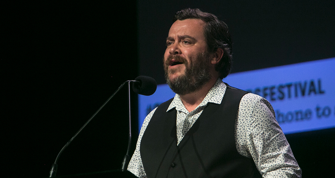Explore upcoming events

They said it couldn’t be done.
And by ‘they’ I mean the 2am voices that visited us for many months in the lead-up to the 2021 Sydney Writers’ Festival.
After the disappointment of 2020, and the rolling challenges, fears and heartaches of COVID responses around the world, the idea of an in-person writers’ festival – of gathering en masse at Carriageworks and beyond to celebrate and challenge the books and writers we love – felt like an impossibility.
Festivals rely on many things to work, but imaginatively and logistically they rely on a shared confidence. We need our writers and thinkers to be confident that we will honour their stories, and protect them as they perform the ultimate vulnerability of appearing on stage. We need our audience to be confident that we have anticipated and addressed all the practicalities of the Festival experience, that whatever rolls out will be professional and pleasurable, edifying and entertaining, considered and consequential in every way.
At the end of 2020, our confidence in predicting what was to come felt pretty shaky.
Collective belief, collective will and the collective need to be back together fuelled this Festival and we couldn’t be prouder of how it all worked out. From the astonishing power of our three Opening Addresses – Melissa Lucashenko’s yarn about holding on and letting go, Tara June Winch’s reflection on Country and nation from afar and Evelyn Araluen’s uncompromising and electrifying call to consider the responsibility that comes with a platform – the guests we invited to tell you the story of Sydney Writers’ Festival 2021 exceeded our wildest expectations.
Walking around the Festival over the week – and God knows I did a lot of walking – nothing made me happier than to catch the snippets of conversations in the corridors and queues: people revelling in what they’d heard, recommending books and authors to one another, arguing about favourite sessions and unpicking particular moments they’d been part of.
Notwithstanding the occasional heart-stopping blip or technical terror, we managed to bring within reach some amazing voices from afar: how great to have Peter Carey in a session, “The landscape I was born into was a rich and remarkable place,” he reflected, “I just didn’t know that until I left”; how surreal to hear from Judy Blume, “I think all of us who write go into some other place. When it’s going well you’re not aware of it. Then a few hours go by and you think, ‘How did I do that? How do I know that?’”; how beautiful to be in the company of other book lovers at City Recital Hall as Kazuo Ishiguro shared, “I’m more interested in this question of whether there’s something about human beings that makes each of us fundamentally lonely. In a way cats and mosquitos perhaps aren’t.” The communal experience of the book that is a writers’ festival is, at its best, a supreme antidote for loneliness. And the 2021 Sydney Writers’ Festival was a writers’ festival at its best.
It was our local writers who made it so, at their natural place front and centre of the celebration. From overtly political sessions – in which journalists and experts, commentators and analysts didn’t shy away from difficult confessions and uncomfortable conclusions – to the literary reflections from novelists and memoirists, poets and screenwriters alike, that gave us such an insight into the imaginative worlds that we all adore.
Our Guest Curators Michael Robotham and Nayuka Gorrie delivered incredible sessions that unpicked the nature and value of telling stories and asked questions that I’ll be thinking about for many years to come. From Nayuka’s sessions on race, class, gender and sexuality, structural power and systemic injustice, to Michael’s discussions on uncovering truths and honouring the legacy of writers gone before us, these were conversations that showed the ways in which it is only through our literature that we can truly begin to understand the complex, varied nature of the Australian experience. Who we are is not explained by glib and tired national myths or self-aggrandising generalities. It is explained by stories; a multitude of rich and messy, generous and divergent experiences and voices and imaginations.
In his packed-out session with Laura Tingle, Richard Flanagan reflected, “When novels succeed, they’re not content, they’re not a mirror, they’re actually life itself.” When a writers’ festival succeeds, it’s not about promoting literature, it is literature itself.
COVID made us lose confidence in coming together again. Today, as authorities nervously track new cases and take on the challenge of keeping these cases in check, the glorious Festival we held last week feels like a little pocket of unreality. We’re so grateful we were able to share it with you, and walk away armed with brains fizzing with ideas and conversations, a formidable booklist of things to read next, and a bit more confidence that with each other, and with the brilliant words of extraordinary writers, a safe and rewarding way forward is within our reach.
Thank you for being part of our Festival.